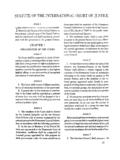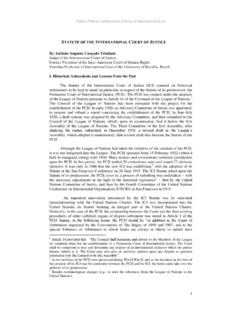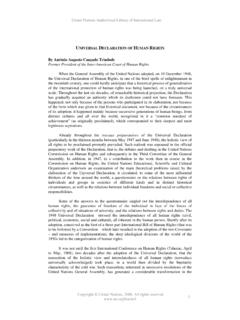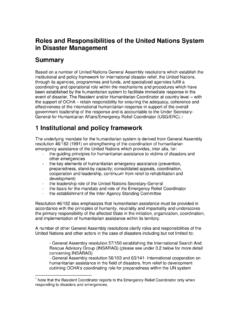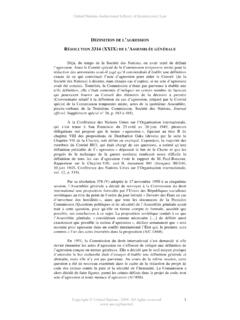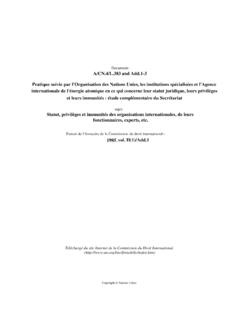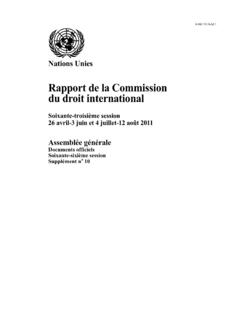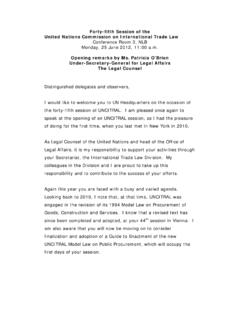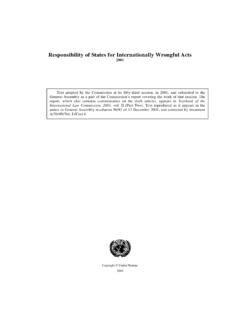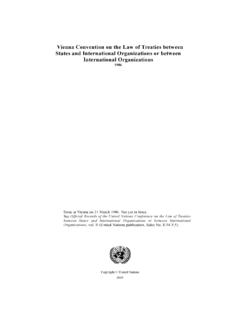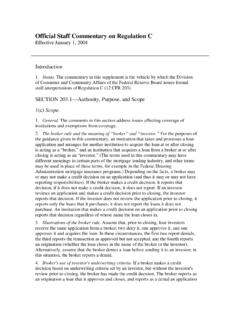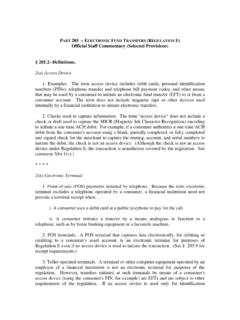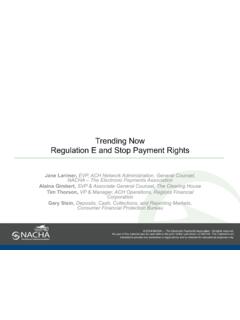Transcription of Draft Articles on Diplomatic Intercourse and Immunities ...
1 Draft Articles on Diplomatic Intercourse and Immunities with commentaries 1958 Copyright United Nations 2005 Text adopted by the International Law Commission at its tenth session, in 1958, and submitted to the General Assembly as a part of the Commission s report covering the work of that session (at para. 53). The report, which also contains commentaries on the Draft Articles , appears in Yearbook of the International Law Commission, 1958, vol. II. Chapter mDIPLOMATIC INTERCOURSE24 AND IMMUNITIESI. Introduction44. In the course of its first session, in 1949, theInternational Law Commission selected " Diplomatic in-tercourse and Immunities " as one of the topics the codi-fication of which it considered desirable and feasible. Itdid not, however, include this subject among those towhich priority was At its fifth session in 1953, the Commission wasapprised of General Assembly resolution 685 (VII) of 5 December 1952, by which the Assembly requested theCommission to undertake, as soon as it considered it pos-sible, the codification of " Diplomatic Intercourse and im-munities" and to treat it as a priority At its sixth session in 1954, the Commission de-cided to initiate work on the subject, and appointed E.
2 F. Sandstrom special Owing to lack of time, the Commission was un-able to take up the subject until its ninth session in1957. At that session, the Commission considered thetopic on the basis of the report prepared by the specialrapporteur ( ). It adopted a provisional set ofdraft Articles with a In accordance with Articles 16 and 21 of itsstatute, the Commission decided to transmit this Draft ,through the Secretary-General, to Governments for theirobservations. By 16 May 1958, the Governments of thefollowing countries had communicated their observations:Argentina, Australia, Belgium, Cambodia, Chile, China,Czechoslovakia, Denmark, Finland, Italy, Japan, Jordan,Luxembourg, Netherlands, Pakistan, Sweden, Switzer-land, Union of Soviet Socialist Republics, United King-dom of Great Britain and Northern Ireland, UnitedStates of America and Yugoslavia ( andAdd.)
3 1-6). The text of these observations is reproducedin an annex to the present report. The Commission alsohad before it a summary ( ), prepared bythe Secretariat, of opinions expressed in the Sixth Com-mittee of the General Assembly relative to the During the present session, at its 448th, 449th,451st to 468th and 474th to 478th meetings, the Com-mission examined the text of the provisional Draft inthe light of the observations of Governments and of theconclusions drawn from them by the special rapporteur24 The term " Intercourse " (in the English text) has tradi-tionally been employed by the Commission in relation to thissubject. The term used in the French text is "Relations (diplo-matiques etc.)". There is no reason why in English the title" Diplomatic relations and Immunities " should not also See Official Records of the General Assembly, FourthSession, Supplement No.
4 10 (A/925), paras. 16 and 20. Ibid., Eighth Session, Supplement No. 9 (A/2456), Ibid., Ninth Session, Supplement No. 9 (A/2693), para. Ibid., Twelfth Session, Supplement No. 9 (A/3623),para. 16.( and and 2). In consequence ofthat examination, the Commission made a number ofchanges in the provisional At its 468th meeting, the Commission decided(under article 23, paragraph 1 (c) of its statute) torecommend to the General Assembly that the Draft ar-ticles on Diplomatic Intercourse and Immunities should berecommended to Member States with a view to the con-clusion of a The Draft deals only with permanent diplomaticmissions. Diplomatic relations between States also as-sume other forms that might be placed under the head-ing of "ad hoc diplomacy", covering itinerant envoys, Diplomatic conferences and special missions sent to aState for limited purposes.
5 The Commission consideredthat these forms of diplomacy should also be studied, inorder to bring out the rules of law governing them, andrequested the special rapporteur to make a study of thequestion and to submit his report at a future Apart from Diplomatic relations between States,there are also relations between States and internationalorganizations. There is likewise the question of the privi-leges and Immunities of the organizations , these matters are, as regards most of the or-ganizations, governed by special Text of the Draft Articles and commentary53. The text of the Draft Articles together with acommentary, as adopted by the Commission at its presentsession, is reproduced Articles ON DIPLOMATICINTERCOURSE AND IMMUNITIESDEFINITIONSA rticle 1 For the purpose of the present Draft Articles , thefollowing expressions shall have the meaningshereunder assigned to them:(a) The "head of the mission" is the personcharged by the sending State with the duty of act-ing in that capacity;(ft) The "members of the mission" are the headof the mission and the members of the staff of themission;(c) The "members of the staff of the mission"are the members of the Diplomatic staff , of theadministrative and technical staff and of the ser-vice staff of the mission;(d) The " Diplomatic staff " consists of the mem-bers of the staff of the mission having diplomaticrank.
6 (e) A " Diplomatic agent" is the head of themission or a member of the Diplomatic staff of themission;8990 Yearbook of the International Law Commission, Vol. II(f) The "administrative and technical staff "consists of the members of the staff of the missionemployed in the administrative and technical ser-vice of the mission;(g) The "service staff " consists of the membersof the staff of the mission in the domestic serviceof the mission;(h) A "private servant" is a person in the do-mestic service of the head or of a member of I. Diplomatic Intercourse IN GENERALE stablishment of Diplomatic relations and missionsArticle 2 The establishment of Diplomatic relations be-tween States, and of permanent Diplomatic mis-sions, takes place by mutual (1) There is frequent reference in doctrine to a"right of legation" said to be enjoyed by every sovereignState.
7 The interdependence of nations and the importanceof developing friendly relations between them, which isone of the purposes of the United Nations, necessitatethe establishment of Diplomatic relations between , since no right of legation can be exercisedwithout agreement between the parties, the 'Commissiondid not consider that it should mention it in the text ofthe Draft .(2) Article 2, which corresponds to article 1 of the1957 Draft , remains unchanged. It merely states that theestablishment of Diplomatic relations between two States,and in particular of permanent Diplomatic missions, takesplace by mutual agreement.(3) The most efficient way of maintaining diplo-matic relations between two States is for each to estab-lish a permanent Diplomatic mission ( , an embassy ora legation) in the territory of the other; but there isnothing to prevent two States from agreeing on othermethods of conducting their Diplomatic relations, for ex-ample, through their missions in a third State.
8 (4) All independent States may establish diplomaticrelations. In the case of a State which is a member of afederation, the question whether it is qualified to do sodepends on the federal of a Diplomatic missionArticle 3 The functions of a Diplomatic mission consistinter alia in:(a) Representing the sending State in the re-ceiving State;(b) Protecting in the receiving State the inter-ests of the sending State and of its nationals;(c) Negotiating with the Government of thereceiving State;(d) Ascertaining by all lawful means conditionsand developments in the receiving State, and re-porting thereon to the Government of the sendingState;(e) Promoting friendly relations between thesending State and the receiving State, and devel-oping their economic, cultural and scientific (1) A detailed enumeration of all the functions of adiplomatic mission would be very lengthy.
9 The Com-mission has merely mentioned the main categories undervery broad headings.(2) First of all, under sub-paragraph (a), comes thetask which characterizes the whole activity of the mis-sion. The mission represents the sending State in thereceiving State. The mission, and in particular the headof the mission, is the spokesman for its Government incommunications with the receiving Government, or inany discussions with that Government to which relationsbetween the two States may give rise.(3) Sub-paragraphs (b), (a) and (d) state theclassic functions of the mission, viz. protecting in thereceiving State the interests of the sending State and ofits nationals; negotiating with the Government of thereceiving State and ascertaining conditions and develop-ments in the receiving State and reporting thereon tothe Government of the sending State.(4) The functions mentioned in sub-paragraph (b)must be carried on in conformity with the rules of inter-national law.
10 The validity of the rule laid down in ar-ticle 40, paragraph 1, which prohibits interference in theinternal affairs of the receiving State, and of the ruleconcerning the exhaustion of remedies in the local courts(in cases in which this rule is applicable) is not affectedin any way.(5) The phrase "conditions and developments" insub-paragraph (d) covers the political, cultural, socialand economic activities of the country, and in general allaspects of life which may be of interest to the sendingState. Only lawful means may be used by the mission inascertaining these conditions and developments.(6) The enumeration of functions as given in thedraft prepared at the ninth session (1957) has been sup-plemented by a reference to certain functions which, inconsequence of the establishment of the United Nationsand of modern developments, have acquired steadily in-creasing importance, viz.
